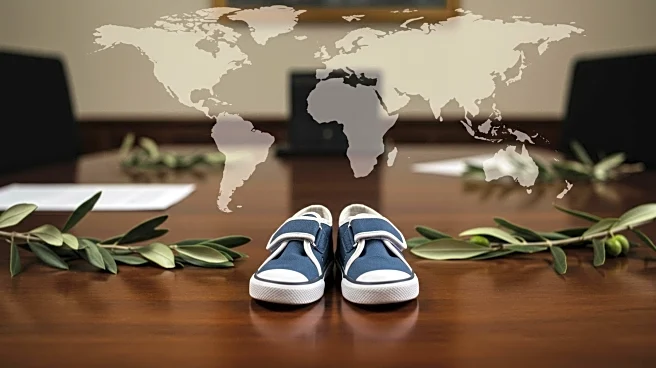What's Happening?
Ukraine's First Lady, Olena Zelenska, is advocating for the return of thousands of Ukrainian children abducted by Russian forces during the ongoing conflict. As peace negotiations between Ukraine and Russia progress, Zelenska emphasizes the importance of prioritizing the repatriation of these children. Since the invasion began in 2022, many children have been taken from schools, orphanages, and families, with Ukrainian officials estimating at least 19,500 children remain unaccounted for. The Russian government has reported higher numbers, claiming 744,000 children have been moved to Russia. Zelenska highlights the challenges in locating and returning these children, as they often undergo name changes and re-registration in Russia, complicating identification efforts.
Why It's Important?
The abduction of Ukrainian children represents a significant humanitarian crisis, with long-term implications for the affected families and the children's identities. The forced deportations and subsequent adoption by Russian families threaten the children's cultural and linguistic heritage. Zelenska's efforts underscore the need for international pressure on Russia to allow independent verification of the children's conditions and facilitate their safe return. The situation highlights the broader impact of the conflict on civilian lives and the importance of addressing human rights violations in peace negotiations.
What's Next?
Ukraine continues to call on international partners to exert pressure on Russia for transparency and cooperation in returning the abducted children. As peace talks progress, Ukrainian leaders insist that the children's return must be a priority in any territorial discussions. The international community's response and involvement will be crucial in ensuring the children's safe repatriation and addressing the humanitarian aspects of the conflict.
Beyond the Headlines
The psychological impact on the abducted children is profound, with reports of mental trauma and identity loss. Zelenska's advocacy highlights the ethical and cultural dimensions of the crisis, emphasizing the need for preserving the children's Ukrainian identity and rights. The situation also raises questions about the role of international organizations in mediating and facilitating humanitarian efforts in conflict zones.









